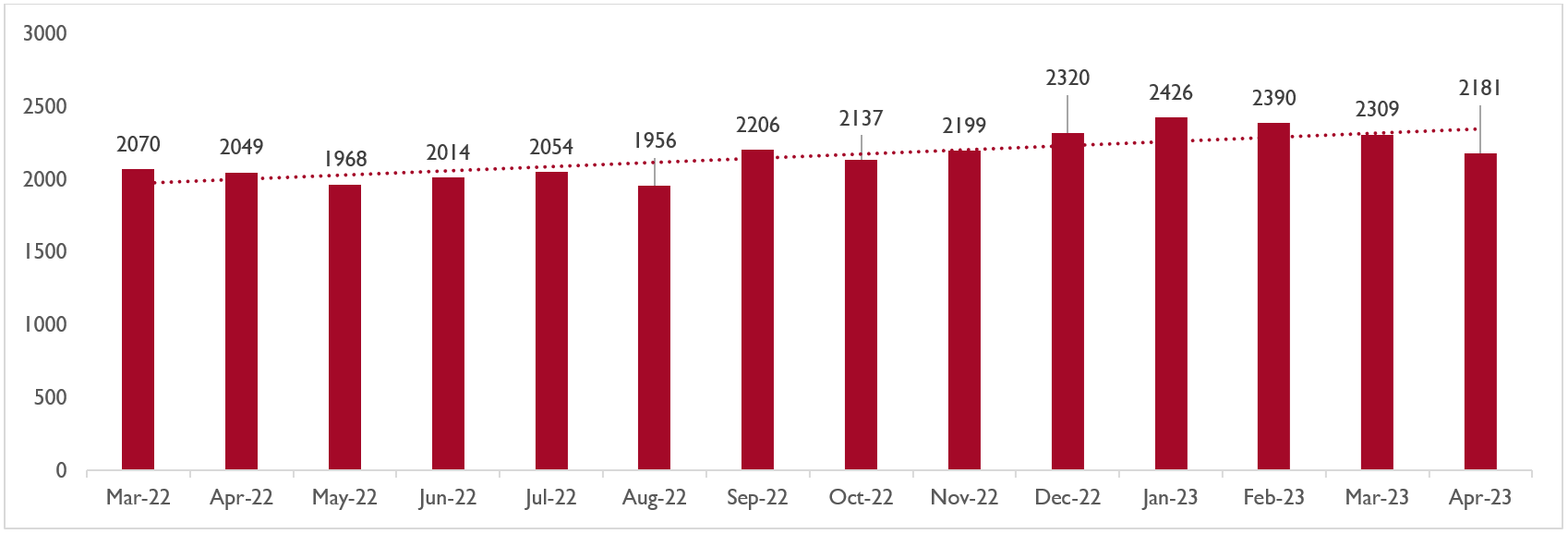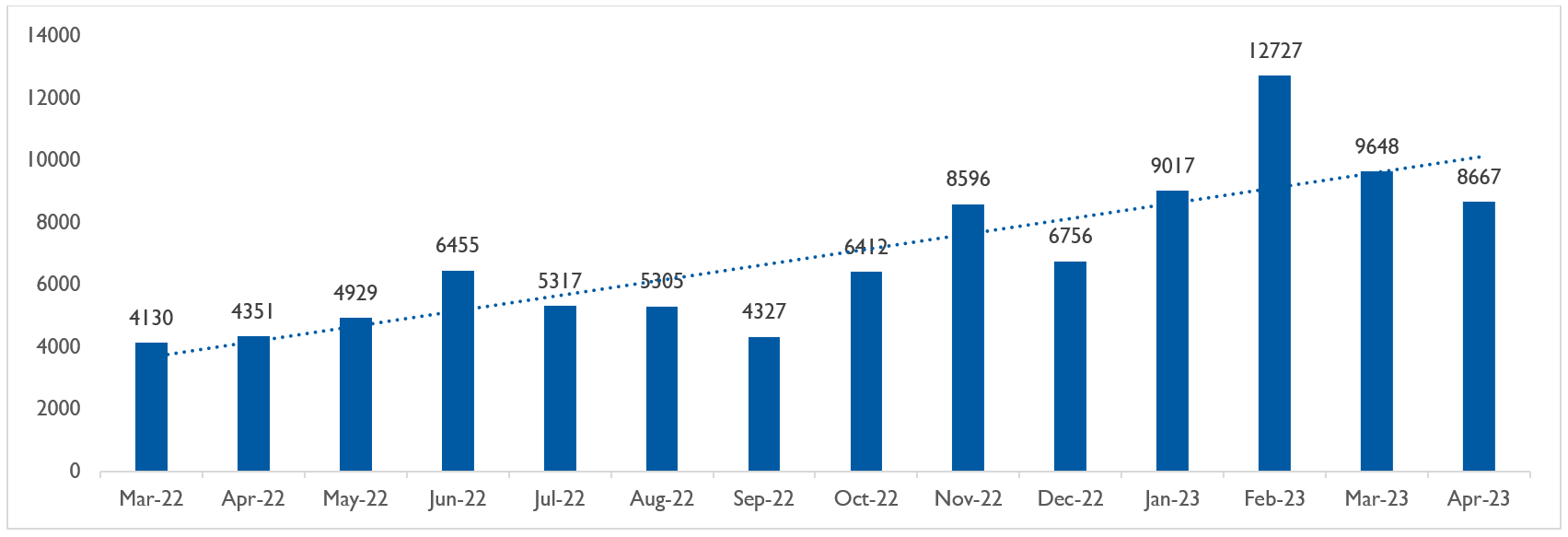Success Story
Advancing maternal health and family planning services through targeted community interventions in Narok County, Kenya
February 2, 2024
Narok County is home to the Maasai Mara ecosystem, one of Kenya’s most critical ecological landscapes. The county’s poor health outcomes include low skilled birth delivery rates at 54 percent, a high teenage pregnancy rate at 28 percent, female genital mutilation (FGM) incidence at 48 percent, as well as high incidences of child marriages fueled by patriarchal Maasai cultural practices. Narok County, like many other counties in Kenya, has yet to attain universal health services which are affordable, available, accessible, and equitable. There are a number of challenges that still need to be addressed for the provision of quality and affordable maternal health services. Long-held sociocultural practices act as barriers to the acceptance and uptake of family planning and maternal health practices, and a lack of training for birth attendants and community health workers propagates harmful misconceptions.
It’s against this background that NPI EXPAND is working in Narok County alongside five local partner organizations with the goal of improving maternal health and family planning outcomes using community-led health interventions. More specifically, NPI EXPAND aims to increase the availability and utilization of quality reproductive health services with a focus on increased awareness, demand, and acceptance of maternal health and family planning services. This will be achieved by addressing sociocultural barriers including FGM, teen pregnancy, early marriage, and a lack of menstrual health support and education, as well as through integration with the environment while strengthening the capacity of local organizations.
NPI EXPAND Kenya is supporting a consortium of five local nongovernmental organizations (NGOs) to implement the project: the National Organization of Peer Educators (NOPE), Anglican Development Services (ADS), Health Rights Kenya (HRK), Community Health Partners (CHP), and the Maasai Mara Wildlife Conservancy Association (MMWCA). These organizations focus on solving the immediate family planning, reproductive health, maternal and child health, and menstrual hygiene needs in Narok County, but also on integrating gender and environmental conservation.
The project’s objectives include:
- Improving availability of integrated maternal health and family planning information and services through integration with environmental conservation and addressing gender barriers
- Increasing awareness, demand, and acceptance of maternal health and family planning services by addressing socio-cultural barriers, including FGM, and through integration with the environment
- Strengthening the community health and environment platforms, systems, and structures to support the uptake of maternal health and family planning services
- Strengthening the capacity of the Narok County health department to plan, finance, and implement cross-sectoral integrated health and environment programs and projects
Adopting a Co-Creation Approach to the Most Vital Needs
Through the five partner organizations, NPI EXPAND Kenya adopted an intervention model focused on investing in community initiatives to create a demand for and raise awareness of maternal health services, and link community members to health services are primary care facilities. Staff embraced a co-creation approach that involved listening, learning, and identifying the needs of the different target populations though community and environmental structures. This methodology ensures that interventions were locally led and responded directly to the needs and desires of the communities.
The specific concerns expressed by the communities cover a broad range of issues related to health, culture, gender, and conservation. Poor access to facilities due to the distance and cost associated with travel is a major barrier. Additionally, low uptake of contraception and high incidences of teenage pregnancies were also listed as concerns. Culturally, FGM and GBV are accepted, and there are a number of misconceptions about family planning held by both men and women. Many of these concerns can be linked back to practices by health facility personnel and service providers, who are often poorly trained or untrained.
Keeping these concerns in mind, our NGO partners mobilized a number of local community groups to reach the most individuals; this includes community health assistants, community health volunteers, and traditional birth attendants. Other participants were community champions, environmental leaders, and faith leaders who were engaged during the roll out of community interventions to create demand for and raise awareness of service provision, and information on maternal health, family planning, gender, and environmental conservation. Community health volunteers were trained to become community-based family planning distributors as an additional resource to provide family planning services and information in the community. To keep the environmental backdrop in mind, environmental rangers were also trained to become champions of family planning and maternal health. The messaging and dissemination abilities of local radio talk shows were utilized to share information, and male-only dialogues including goat eating events were held. These discussions were around maternal health services with representation from different generations of men to create peer to peer influence and encourage more open dialogue about these issues.
Seeing Results
After the implementation of the NPI EXPAND project activities, data in the Kenya Health Information System (KHIS) showed a noticeable increase in the number of people who are accessing skilled delivery and family planning services and information. This increase suggests that the community mobilization activities of the NGO’s helped to increase demand for services. However, with this increase in demand for services, it became apparent that training of healthcare workers would be needed to meet the demand and maintain a high quality of care.
Figure 1. Deliveries Attended and/or Conducted by Skilled Delivery Care, Narok County

Figure 2. Number of Women of Reproductive Age Receiving Family Planning Commodities, Narok County

The figures above based on KHIS data show that from March 2022 to April 2023 there was an increase in the number of women who attended skilled deliveries as result of outreach done in the community through messaging. This increase is significant, because the alternative to women delivering in health facilities alongside skilled providers is that women are delivering at home without a trained provider. Unassisted deliveries that occur at home are risky and can be dangerous for both the mother and their child. Overall, this increase is extremely positive, suggesting that women learned about and accepted the benefits of delivering in health facilities under the care of trained traditional birth attendants.
In the same breath, data indicates an increase in women of reproductive age who received family planning commodities from March 2022 to April 2023. In February 2022, NPI EXPAND Kenya conducted a community-based family planning distributor training which can be linked to the observed surge in the number of women of reproductive age accessing family planning services.
Lessons Learned
Through the work that was done in Narok County and the analysis of subsequent data, it became clear that involving key groups within the community and opinion leaders in health programs may improve the uptake of health services in a community. If the community has a say in the programs, the likelihood that the interventions will be used and sustained is much higher. Community-led health interventions lead to more sustainable and effective uptake of health services within the same communities.
Another big lesson learned is the importance of gaining the trust of the community by collaborating with community champions, traditional birth attendants, and community health workers and volunteers. Strengthening the quality of care that community health volunteers and community health assistants are able to provide is essential to building trust. By providing technical training to the community health assistants that supervise community health volunteers, trust, acceptance, and recognition were able to be created and maintained within the community. The data showed that increased levels of expertise by health volunteers, assistants, and traditional birth attendants led to an increase in the number of women who give birth under the supervision of a skilled provider. Armed with additional training, these providers are now considered trustworthy sources of healthcare and information for expectant mothers.
Additionally, combatting long-held community beliefs surrounding family planning and maternal health requires collaboration with the community itself. At the center of keeping women safer and more informed about their options is prompting dialogue and disseminating vital information among trustworthy sources. NPI EXPAND Kenya, in collaboration with local NGOs, was able to increase maternal health knowledge within communities through targeted community interventions that addressed sociocultural barriers and had a direct and lasting impact.